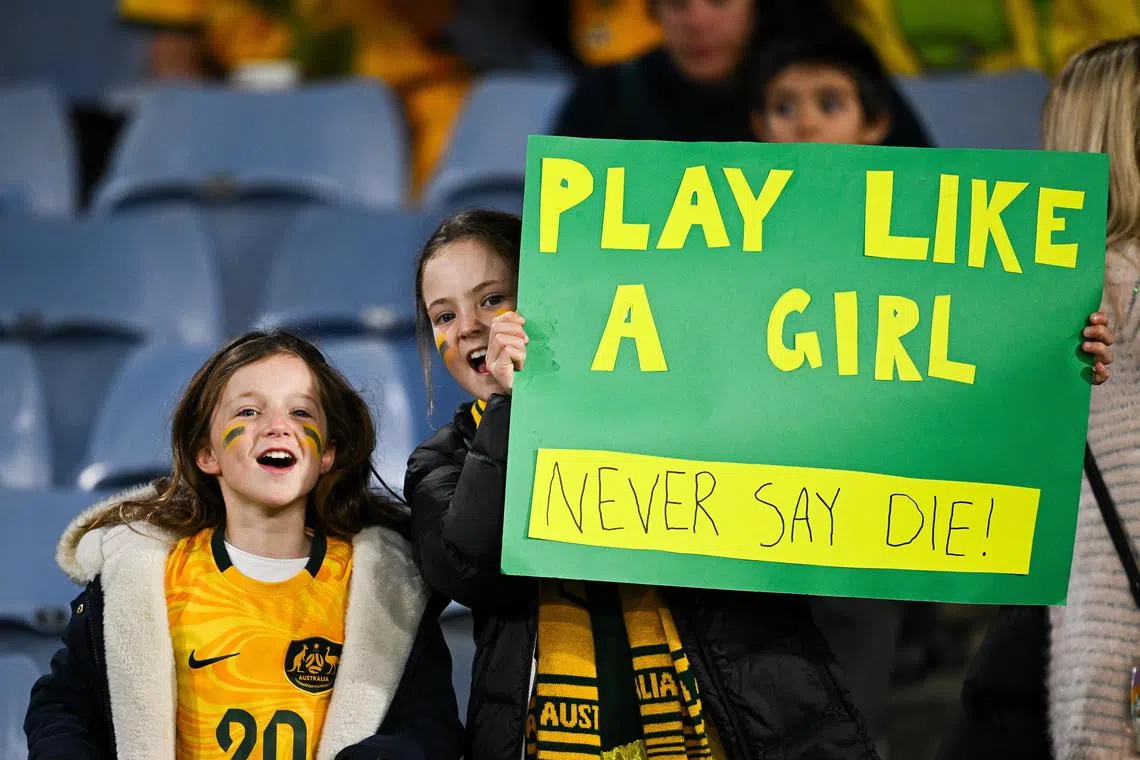Commentary
Why is women’s football worth it? This is why
Sign up now: Get the biggest sports news in your inbox

Australia fans turned out in force to cheer on the home favourites during the semi-final clash against England at the Women's World Cup.
PHOTO: EPA-EFE
Every day, a record is obliterated. Every day, another chapter is written in women’s football at this World Cup. Dawn has broken.
For so long, women footballers have had to do so much with so little. For generations, they had to train, perform, petition, galvanise, fund-raise – just to show why women’s football was worth the investment. Now, the proof is all around them.
Proof is in the competitiveness, gifting us an unpredictable and magnificent tournament. This World Cup has seen giants fall and underdogs rise.
All former champions were knocked out before the semi-finals. World No. 72 Morocco advanced to the knockout phase in their first World Cup. Co-hosts Australia blazed an inspiring, historic trail to the semi-finals
It is only human to be drawn to the underdog story, because we like to see ourselves in them. We want the hope that they have. That the little one may be mighty on one glorious day. Perhaps because women’s football has always been an underdog – overlooked and under-estimated – this Cup has felt like one big celebration.
In the knockout rounds, some games finished with dramatic, late winners. Three goals were scored in the final 10 minutes of regulation time between semi-finalists Spain and Sweden – each team getting a brief glimpse of glory, a dance with destiny.
Some games ended in the cruel roulette of penalties. England against Nigeria. Sweden against the United States. The penalties between Australia and France – with 10 kicks taken by each side – set the record for the longest penalty shoot-out in World Cup history ever, men’s or women’s.
Proof is in the numbers. A crowd of 42,958 attended the US-Portugal match in Auckland and broke the record for a football match in New Zealand.
More than 75,000 fans packed Stadium Australia in Sydney to watch the co-hosts triumph over Denmark in the round of 16. And the same numbers watched the Matildas clinch victory over Les Bleues in the quarter-finals. And Matilda mania was in full swing in their defeat by England.
Records continued to fall and, in TV numbers, that semi-final was the most watched – in any genre – in the host country since 2001, when the existing rating system was established.
Proof is in the faces painted in green and gold in Stadium Australia. One girl held up a sign: “I’m going to be the next Sam Kerr.”
Call her inspired. It is in the masses in Melbourne’s Federation Square watching the live telecast of the semi-finals, letting out a thunderous roar when the talismanic Kerr dribbled from the halfway line and scored the equaliser.
It is in all the boys and girls watching the World Cup from across the world – Vietnam, Nigeria, Ireland, Costa Rica – who want to play in a World Cup, and know that they can achieve their dreams. It is in the young, the seniors and weekend warriors heading to a kickabout on Sunday.
But what’s next?
Women’s football is often in a precarious and fragile situation. Its history is littered with stories of would-have-beens and could-have-beens.
The books are filled with yawning gaps and blank spaces – decades stolen from players by associations paralysed by power struggles and bureaucratic indifference. Sometimes, all it takes is one head coach, or one administrator to leave, and the entire system falls apart.
We cannot let this happen again. This World Cup has given us new legends and heroes, renewed dreams and hopes.
Next year, at the Paris Olympics – a major fixture on the women’s football calendar as it is a senior tournament, unlike the men’s – the game will again be in the spotlight. Closer to home, the Asian Football Confederation recently announced a Women’s Champions League from 2024-25.
Let’s keep this Beautiful Game alive for more than once every four years, for the young – and the young at heart – find their heroes only if they can enjoy the wonders of this sport. Let them play and let’s give the game the support, attention, parity, sponsors and respect it deserves.
Today, we enjoy this beautiful, hard-won moment in the sun. Tomorrow, we put on our boots and fight again.
Sara Merican was formerly a national footballer and was in the Lion City Sailors side who won the Women’s Premier League in 2022. She also competed in cricket at the 2023 SEA Games.


